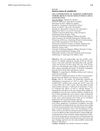7 citations,
May 1977 in “Deutsche medizinische Wochenschrift/Deutsche Medizinische Wochenschrift” Antiandrogen treatments can help with various women's health issues but often require ongoing use.
6 citations,
July 2018 in “DOAJ (DOAJ: Directory of Open Access Journals)” A woman had a rare liver tumor causing male-like physical changes, highlighting the need for thorough checks when such symptoms appear.
 6 citations,
April 2017 in “Journal of Dermatological Science”
6 citations,
April 2017 in “Journal of Dermatological Science” Ovariectomized mice mimic postmenopausal hair loss, and estradiol helps maintain hair density.
 6 citations,
September 1998 in “The Journal of The British Menopause Society”
6 citations,
September 1998 in “The Journal of The British Menopause Society” Testosterone replacement may help postmenopausal women with sexual function and bone density, but suitable treatments are limited.
 5 citations,
August 2018 in “Sexual Medicine Reviews”
5 citations,
August 2018 in “Sexual Medicine Reviews” 5α-Reductase inhibitors do not consistently increase testosterone levels in the blood.
 5 citations,
May 2012 in “Andrologia”
5 citations,
May 2012 in “Andrologia” Finasteride use may be linked to rare testicular tumor, but more research needed.
 4 citations,
December 2021 in “Archivio italiano di urologia andrologia”
4 citations,
December 2021 in “Archivio italiano di urologia andrologia” Certain drugs, especially antiandrogens and spironolactone, significantly increase the risk of gynecomastia.
 4 citations,
December 2013 in “British Journal of Dermatology”
4 citations,
December 2013 in “British Journal of Dermatology” ESR2 gene linked to female-pattern hair loss.
4 citations,
January 1991 in “Journal of dermatological treatment” Goserelin and oestradiol treatment slightly improved hairiness but did not significantly change sebum production or hair characteristics in mildly hirsute women.
 3 citations,
November 2010 in “Rheumatic Diseases Clinics of North America”
3 citations,
November 2010 in “Rheumatic Diseases Clinics of North America” Pregnancy can cause symptoms similar to rheumatic diseases, making diagnosis difficult, and affects various body systems, requiring careful distinction between normal changes and serious conditions.
 2 citations,
August 1987 in “Australasian Journal of Dermatology”
2 citations,
August 1987 in “Australasian Journal of Dermatology” Birth control pills can cause skin issues but may help with acne and hirsutism, and choosing the right type can minimize side effects.
 2 citations,
January 1986 in “Dermatology”
2 citations,
January 1986 in “Dermatology” A woman with Kallman's syndrome also developed alopecia universalis, a condition not previously linked to Kallman's.
 1 citations,
December 2017 in “Acta biomedica scientifica”
1 citations,
December 2017 in “Acta biomedica scientifica” Women of reproductive age with polycystic ovary syndrome often experience hair loss.
 September 2024 in “International Journal of Molecular Sciences”
September 2024 in “International Journal of Molecular Sciences” High doses of testosterone disrupt hormone levels and receptor expression in the uterus, affecting fertility.
 August 2023 in “Journal of Cosmetic Dermatology”
August 2023 in “Journal of Cosmetic Dermatology” Exosomes from hair papilla cells and the Chinese medicine Liao Tuo Fang can potentially promote hair growth and could be used to develop hair growth drugs.
 July 2023 in “The Journal of Clinical Endocrinology and Metabolism”
July 2023 in “The Journal of Clinical Endocrinology and Metabolism” Gender-affirming hormone therapy improves physical performance in trans men to the level of cisgender men, while in trans women, it increases fat mass and decreases muscle mass, with no advantage in physical performance after 2 years.
 July 2023 in “The journal of sexual medicine”
July 2023 in “The journal of sexual medicine” Anabolic-androgenic steroids harm male hormone levels, sperm, metabolism, and can cause acne, hair loss, and breast growth.
 June 2023 in “The journal of sexual medicine”
June 2023 in “The journal of sexual medicine” The treatment helped a transgender woman stop drinking, improved her mental health, and reduced her gender dysphoria.
 March 2023 in “European journal of internal medicine”
March 2023 in “European journal of internal medicine” The patient's long-term symptoms were due to Sheehan's syndrome, which improved with hormone therapy.
 November 2022 in “Research Square (Research Square)”
November 2022 in “Research Square (Research Square)” The research provides insights into hair follicle growth in forest musk deer by identifying key genes and pathways involved.
 May 2021 in “Journal of the Endocrine Society”
May 2021 in “Journal of the Endocrine Society” A 23-year-old woman's missed periods were caused by a rare genetic disorder treated with hormone patches.
 October 1961 in “Archives of Dermatology”
October 1961 in “Archives of Dermatology” Reassurance is important for postpartum hair shedding as it likely won't cause complete baldness.
 July 2010 in “British Journal of Dermatology”
July 2010 in “British Journal of Dermatology” Hair loss in women may have multiple causes, and eyebrow regrowth possible with specific injections.

Androgenetic alopecia, or hair loss, is caused by genetic factors and hormones, with different mechanisms in men and women, and can be linked to insulin resistance and polycystic ovary syndrome.
 102 citations,
January 2003 in “Dermatology”
102 citations,
January 2003 in “Dermatology” Smoking may contribute to hair loss in men.
19 citations,
June 2021 in “The world journal of men's health” Using anabolic-androgenic steroids can harm men's reproductive health and increase the risk of heart problems and death.
 May 2021 in “British Small Animal Veterinary Association eBooks”
May 2021 in “British Small Animal Veterinary Association eBooks” If a dog's skin tests are normal but it has hair loss, consider other non-endocrine causes and choose tests based on the hair loss pattern.
 September 2009 in “Annales D Endocrinologie”
September 2009 in “Annales D Endocrinologie” DHEA supplementation may improve quality of life, neuropsychological functions, and sexual satisfaction in individuals with adrenal insufficiency, but more research is needed to confirm its safety and effectiveness.
 8 citations,
November 2019 in “Dermatologic Clinics”
8 citations,
November 2019 in “Dermatologic Clinics” AGA treatments like minoxidil and LLLLT are safe and effective for gender minority patients.
 7 citations,
May 2016 in “SpringerPlus”
7 citations,
May 2016 in “SpringerPlus” Some breast cancer patients on hormone therapy experience hair loss, and treatments like certain topical inhibitors and supplements may help without harming their cancer prognosis.

























